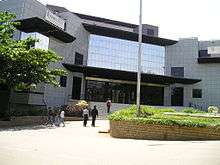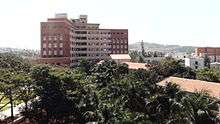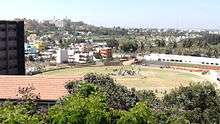PES University
| Type | University |
|---|---|
| Established | 1972[1] |
| Founder | Dr .M. R. Doreswamy |
| Chancellor | Dr. M. R. Doreswamy |
| Vice-Chancellor | Dr. K N Balasubramanya Murthy |
| Principal | Dr.K S Sridhar[2] |
| Pro Chancellor | Dr. Jawahar Doreswamy |
Administrative staff | ~500 |
| Undergraduates | ~4000 |
| Postgraduates | ~1000 |
| Location |
Bengaluru, Karnataka, India 12°56′1.75″N 77°32′4.12″E / 12.9338194°N 77.5344778°E |
| Campus |
Urban |
| Colors | Blue and Red |
| Mascot | The Mastodon |
| Website |
www |
PES University (PESU) is a private university in Bengaluru, India. Established in 1972,[4] it is focused on four main educational areas: Engineering, Medicine, Management and Life Sciences. The institutions offer both foundation courses in these areas, as well as specialization with a Bachelors/ Master/ PhD degree. Originally named the PES Institute of Technology (PESIT), it was renamed in 2013.[5]
History
PESU is managed by the People's Education Society (PES), which was founded in 1972, in a rented gymnasium in Bengaluru, with around 40 students. PES currently manages over 45 educational programs in Karnataka and neighboring Andhra Pradesh, with a total of over 15000 students.[6] PESU was founded in the year 1988.[4]
Campus

PESU is located on the 100 Feet Ring Road in the Hosakerehalli locality of Bengaluru. The college has six major blocks:
A - Block
The A - Block is the administrative building, called the Prof M.R.D Silver Jubilee Complex, named after the Chairman of the PES group M.R. Doreswamy. The building has the central library, the offices of the Director, Chairman, Principal and Registrar. It also has the Department of Science and Humanities which handles the first year students for BE courses. It houses the Central Library and a Campus Mart where the students can buy stationery items and books.
There is an auditorium in the A Block with 800+ seating capacity.
B - Block
B - Block houses computer science department semesters 3-8.
C - Block
C - Block houses the Department of Mechanical Engineering. It also has the offices of the cultural department, Team Haya which is the PES Formula Team. It also houses the GM PACE center and the chemistry laboratory. Department of mechanical engineering also has an aero design team called team 'Αίολος', Aeolus. Team Aeolus has participated in sae west and they were placed first in Asia and fifth in world in design competition.
D - Block
D - Block is for the Electrical & Electronics Engineering department. The block features the High Voltage Lab (Power systems), AC Machines Lab, DC Machines Lab, Analog Electronics Lab, Power Electronics Lab and Computer Lab.
E - Block
E - Block houses the offices of the Dean of Academics and Evaluation and other UG and PG departments like Biotechnology Engineering, Bachelor of Computer Applications (BCA), Bachelor of Hotel Management, Bachelor of Business Management and Master of Business Administration (MBA)
F - Block (Pāṇini Block)

F - Block is the Center for Advanced Studies (CAS). It has the Department of Information Science and Engineering, the Department of Computer Science and Engineering, the Department of Electronics and Communications Engineering, and the Department of Telecommunications Engineering. It has the CORI lab along with some research setups like FreeScale Semiconductor VLSI Lab and Centre for Intelligent Systems. The block was named as 'Panini' block, after the Sanskrit grammarian Pāṇini.[7]
G - Block
The G-Block or the Aamatra block hosts the Science and Humanity Department which currently handles the first year students.
Academic profile
Admission criteria
PESU admits 40% of its students to undergraduate courses based on their Karnataka CET and 60% seats based on PESSAT (the university's own entrance test) ranks. PESU also admits students under Management quota,which does not place any merit requirements.There is a lateral entry scheme in place, by which students holding diploma degrees can directly enter the second year of study in engineering. On graduating students receive a Bachelor of Engineering degree.
Students are admitted to postgraduate courses based on their GATE test scores as well as on their Post Graduate Karnataka CET scores. Upon graduating, they receive a Master of Technology degree.[8] The online registrations for PESSAT 2016 has commenced.
Under Graduate Programs
PESU offers Bachelor of Technology (B.Tech.), formerly B.E., 4 year degree programs in the following disciplines:
- Computer Science and Engineering (total number of seats available is 480)
- Mechanical Engineering (total number of seats available is 240)
- Electronics and Communication Engineering (total number of seats available is 360)
- Electrical and Electronics Engineering (total number of seats available is 120)
- Biotechnology (total number of seats available is 60)
- Civil Engineering (total number of seats available is 60)
Postgraduate departments
- Department of MBA, which includes, Finance, Marketing and HR streams
- Department of MCA
- M.Tech (Computer Science and Engineering)
- M.Tech (Electronics and Communication Engineering)
- M.Tech (Mechanical Engineering)
- M.Tech (Web Technologies)
- M.Tech (Power Electronics)
All estimates are approximate only. The number of seats are subject to change.
Faculty and research
Crucible Of Research and Innovation (CORI) is a multi-disciplinary research centre at PESU. It was inaugurated by C.N.R Rao former Director, Indian Institute of Science on February 7, 2010. It has research facilities and a set of dedicated research staff who carry out research in their areas of interest.[9]
Centre for Intelligent Systems (CIS) is a research centre at PESU, which is researches on topics including Control Systems, Speech, Image and Signal Processing, Robotics, Artificial intelligence, and Low Power VLSI Design.[10]
PISAT
On 26th September 2016, PISAT was successfully placed into polar Sun Synchronous Orbit (SSO) orbit by India’s Polar Satellite Launch Vehicle, in its thirty-seventh flight (PSLV-C35). Prime Minister, Narendra Modi tweeted “I applaud the industrious and innovative students of PES University, Bengaluru for creating PISAT that was launched successfully today”. The launch vehicle, carrying multiple satellites including PISAT lifted off from Sriharikota in Andhra Pradesh at 9:12 am. The team on the PES University campus is preparing to receive data from the satellite.
PISAT is a three axis stabilized imaging nanosatellite weighing about 5 Kg and generates 13 watts power with S-band RF communication. The major subsystems are: an imaging camera to provide earth imageries with 80 meter resolution, On Board Computer (OBC), Attitude Determination and Control System (ADCS), RF communication system with S Band frequency, telemetry, telecommand, thermal system, structure and Electrical Power System (EPS). The ground software was developed for on-ground orbit determination essential for mission operations.[11]
PISAT was shipped to Sriharikota High Altitude Range (SHAR) rocket launch centre on 11th September 2016 in the presence of Director of ISRO Satellite Centre (ISAC), Dr. Mylswamy Annadurai, SSS PD Mr. Amareshwar Khened, and other officials. A team of 11 from PES University were present at SHAR for pre-launch activities of PISAT from 11th to 17th September. During the period PISAT was interfaced with ejection mechanism and integrated with the launch vehicle. Earlier, after stringent performance and quality tests by expert committee, the nanosatellite was formally handed over to ISRO at a function on the campus attended by top officials from the government and ISRO on April 20, 2016.
The University takes pride in enabling students to get hands on experience and understand critical space technology and quality requirements. The joint initiative of ISRO and PES University and five other colleges proved to be a great opportunity for students to work on space research, analyze launch readiness and related activities. As a policy ISRO extends support to technical institutions and student missions. After extensive technical evaluation by ISRO scientists, PES University was given the responsibility of leading design, development, fabrication and testing of student nanosatellite, PISAT. Four other engineering colleges collaborated on the project. The University established Electro Static Discharge Room and Satellite Control Facility on campus.[12]
Course content and grading
All the courses which have been conferred autonomous status have their departments set their own course content and grading system. The college follows the credit-based system of performance evaluation, with proportional weighting of courses based on their importance. The total marks (usually out of 100) form the basis of grades, with a grade value (out of 10) assigned to a range of marks. For each semester, the students are graded by taking a weighted average of all the subject grades with their respective credit points. Each semester's evaluation is done independently with a cumulative grade point average (CGPA) reflecting the overall performance across semesters. Till June 2012, the grading system being followed was relative grading,[13] but the college switched to an absolute grading system after consultations with the university.[14]
Ranking
| College rankings | |
|---|---|
| Engineering – India | |
| Outlook India[15] | 33 |
| Dataquest[16] | 30 |
| Private colleges: | |
| Mint[17] | 13 |
| Business – India | |
PES University was ranked number 7th in the 'Most Trusted Educational Institutes' list by brand analytics and insights company TRA (formerly Trust Research Advisory). PESIT was ranked #33 by Outlook India Top Engineering Colleges of 2013, from 35 in 2012[15] and #30 by Dataquest India's Top Engineering Colleges 2011.[16] In rankings limited to private colleges it was ranked #13 by Mint Top 50 Private Engineering Colleges of 2009.[17]
Student life

College festivals
Epsilon: Annual science fest organized by the Science and Humanities Department[18][19][20]
Celesta: College cultural day
Vistas: National-level management fest
Prakalpa: Exhibition featuring best projects of each department
Conquiztador: Annual high school quizzing championship for the Dr. M R Doreswamy Trophy for Quizzing Excellence
Ayana: A 24-hour hackathon organised by the Department of Computer Science, PES Institute of Technology[21]
Aatmatrisha: Aatmatrisha, the annual intercollegiate techno-cultural fest of PES Institute of Technology, Bengaluru, provides an imposing platform for the students across the country to showcase their talents in a host of technical and cultural events.
Samarpana: Samarpana was started in 2009 as an annual event dedicated to the martyrs of our nation. In Samarpana, the students work towards spreading awareness among the youth about the sacrifices made by the armed forces of India and reach out to their families, and express gratitude. Nautanki, the club was also extensively involved in creating theatrical performances for the same.
HashCode: Hashcode is a 24 hour Hackathon, an event to promote ideas, creativity and quick-wit where the participants are exposed to fever-pitched (albeit healthy) competition. It’s a great platform to give shape to their stagnant ideas. This Hackathon is organized by the “Student Developer Community” with support from Microsoft Mobile Innovation Lab, with constant support from PES University and Microsoft India. This was the fourth iteration with an open hack theme, so all tracks and fields related to computing were allowed. [22]
College clubs
- IET Student Chapter - Local student chapter of IET, world's largest multi disciplinary professional organisation, based in UK.[23]
- Microsoft Mobile Innovation Lab(Formerly Nokia Lab) - It is an active lab of PES University which organizes student development programs like Summer Internship, Incito (Ideathon) and Hash Code(24 Hour Hackathon) for the benefit of the Student community. Summer Internship is usually held during the month of June – July for a period spanning 8 weeks. Around 40 students from PES University are selected from an Aptitude Test followed by an interview round from more than 300 applicants. From the selected students,teams are created and Project domains allotted to each team. The domains which are allotted are :
a. Sensor Networks (Security, Intelligent Routing Algorithms, Power Management)
b. Internet of things (Healthcare, Home Automation, Physiotherapy)
c. 3-D Visualisation and Gesture Control using Kinect Camera
d. Healthcare (Data visualisation and data mining)
e. Robotics
- Ordell Ugo - A Virtual Entity concept at PES University.
- DebSoc - The Debating Society of PES University. This club primarily focuses on competing in national and international level Parliamentary Debating (PD) competitions.
- Nautanki - The college's official dramatics and film making team. Nautanki maintains a member strength of around 30 students. Nautanki was both the mime and one-act play champions at the University (VTU) fest held at Dayanand Sagar College of Engineering, Bengaluru. Nautanki's alumni and network is part of renowned theater, film and fine art performances all around the world.
- PES Talkies - The club's success and popularity is a result of the motto that all its members abide by, according to which they 'Go Talkies or Go Home.'
- Ninaada - Indian cultural forum
- PES.NET - DotNet Student User Group of PES group of institutions.
- Fantom - Western music band
- Pulse - Western dance crew of PESIT, founded in 2005.
- Trance - Western Contemporary dance troupe.
- "'Pitch Please"' - The only ACapella group in the College.
- Ducks - Hiking and mountain climbing club
- Sanskrithi - Contemporary/semi-contemporary dance troupe.
- The Quotient Quiz Club - The official quiz club of PESIT. It is the flag bearer for all quizzing activities on campus. Known for its own quizzing style, the QQC is an active 45 member club with quizzes happening regularly.
- Team Haya - Racing car team
- Team PACE - Global Collaborative Engineering team
- Team Aeolus - Aero-design team
- Pixels - Photography Club
- Eclat - Annual magazine by and for the students
- Mad Maniacs - Mad Add team
- Homebrew Club - A club dedicated to helping bring people who love hardware and work on hardware together
- PES Open Source community - A group working on promoting the use of free and open source software
- Student Nokia Developer - A community working towards researching and developing apps and games for Nokia devices
- IEEE Student Branch - student run group which conducts workshops, technical activities and industrial visits that bring together students of similar interests and create an atmosphere of cohesive learning[24]
- Papyrus - Pesit's own newsletter by students, published monthly
- QQC - Quotient Quiz Club
- RCP - Rotaract Club of PES University - team committed to 'Enlightening Human Lives' by undertaking various socially responsible sctivities
- PES E-Cell - organisation run by students that aims at manifesting the latent entrepreneurial spirit of students
- AndroidLabs - A community working towards researching and promoting mobile application development on the Android platform[25]
 Campus airspace
Campus airspace Parking lot
Parking lot Garden
Garden Auditorium
Auditorium- Boys' hostel
References
- ↑ "About us". PESIT, Bengaluru. Retrieved 29 September 2011.
- ↑ "Balasubramanya Murthy". PESIT, Bengaluru. Retrieved 28 October 2011.
- ↑ "Contact address". PESIT, Bengaluru. Retrieved 28 October 2011.
- 1 2 "Hosmac Foundation in association with PESIT offers PGDHM" (PDF). HOSMAC Foundation. Retrieved 28 October 2011.
- ↑ "About PES University". PES University. Retrieved May 14, 2014.
- ↑ "PESIT students outshine in Sweden-India Nobel Memorial Quiz". ThisweekBengaluru. 14 September 2011. Retrieved 28 October 2011.
- ↑ "Report of ICEMC2 2011" (PDF). PESIT. Retrieved 10 January 2012.
- ↑ "M.Tech Computer Science". PESIT, Bengaluru. Retrieved 28 October 2011.
- ↑ Gutka, Charmi. "Sparsh Learning Raises Angel Funding From Blume Ventures And Tempus Capital". Dealcurry. Retrieved 28 September 2011.
- ↑ "PESIT Telecommunications". PES Institute of Technology. Retrieved 28 September 2011.
- ↑ http://www.isro.gov.in/Spacecraft/pisat
- ↑ http://www.ndtv.com/india-news/isros-rocket-takes-off-tomorrow-with-8-satellites-and-a-big-challenge-1466268
- ↑ Balakrishna, Shruti (15 December 2008). "City colleges slowly switching to grading system". Times of India, Bengaluru. Retrieved 28 October 2011.
- ↑ Student manual. Bengaluru: P.E.S. Institute of Technology. 2012. pp. 4–5.
- 1 2 "Top Engineering Colleges". Outlook India. 16 June 2012. Retrieved 17 June 2012.
- 1 2 "India's Top Engineering Colleges 2012 (DQ-CMR T-Schools Survey 2012)". archive.dqindia.com/. Dataquest. 15 December 2012. Retrieved 10 January 2012.
- 1 2 "Top 50 Private Engineering Colleges of 2009" (PDF). Mint. 23 June 2009. Retrieved 9 September 2011.
- ↑ "Overthere, PESIT, Bengaluru". The Telegraph, Calcutta. 26 January 2005. Retrieved 10 January 2012.
- ↑ "Education and career fair from May 19". The Hindu. 22 April 2004. Retrieved 10 January 2012.
- ↑ http://www.epsilon.pes.edu
- ↑ https://web.archive.org/web/20120414043745/http://ayana.pes.edu/. Archived from the original on April 14, 2012. Retrieved April 13, 2012. Missing or empty
|title=(help) - ↑ Student Nokia Developer - We the students who develop!
- ↑ http://www.theiet.org
- ↑ http://www.ieeepesit.in/
- ↑ https://www.pes.edu/androidlabs
External links
| Wikimedia Commons has media related to PES University. |